- Home
- Dan Simmons
Olympos t-2 Page 3
Olympos t-2 Read online
Page 3
The runner handed the flickering torch to Hector, bowed, and descended the stairs backward, still bowing.
Menelaus looks up as a dark cloud moves in over the city.
“Phoebus Apollo shrouds the day,” whispers Odysseus.
A cold wind blows in from the west just as Hector drops the torch into the fat—and resin-soaked timber below the bier. The wood smokes but does not burn.
Menelaus, who has always been more excitable in battle than his brother Agamemnon or many other of the coolest killers and greatest heroes among the Greeks, feels his heart begin to pound as the moment for action approaches. It does not bother him so much that he may only have moments more to live, as long as that bitch Helen goes screaming down to Hades before him. If Menelaus, son of Atreus, had his way, the woman would be thrown down into the deeper hell of Tartarus where the Titans whom the dead god Dionysos had just been prattling about still scream and blunder about in the gloom and pain and roar.
Hector gestures, and Achilles carries two brimming goblets up to his former enemy and then goes back down the steps. Hector raises the goblets.
“Winds of the West and North,” cries Hector, raising the goblets, “blustering Zephyr and cold-fingered Boreas, come with a strong blast and light the pyre where Paris lies in state, all the Trojans and even the honoring Argives mourning around him! Come Boreas, come Zephyr, help us light this pyre with your breath and I promise you splendid victims and generous, brimming cups of libation!”
On the balcony above, Helen whispers to Andromache, “This is madness. Madness. Our beloved Hector invoking the aid of the gods, with whom we war, to burn the corpse of the god he just slaughtered.”
Before Andromache can reply, Cassandra laughs aloud from the shadows, drawing stern glances from Priam and the old men around him.
Cassandra ignores the reproachful stares and hisses at Helen and Andromache. “Madnesssss, yessss. I told you all was madness. It’s madness what Menelaussss is planning now, Helen, your slaughter, moments away, no less bloody than the death of Dionysos.”
“What are you talking about, Cassandra?” Helen’s whisper is harsh, but she has gone very pale.
Cassandra smiles. “I’m talking about your death, woman. And just minutes away, postponed only by the refusal of a corpse pyre to light.”
“Menelaus?”
“Your worthy husband,” laughs Cassandra. “Your previous worthy husband. The one who’s not rotting away now like charred compost on a woodpile. Can’t you hear Menelaus’ ragged breathing as he prepares to cut you down? Can’t you smell his sweat? Can’t you hear his foul heart pounding? I can.”
Andromache turns away from the funeral and steps closer to Cassandra, ready to lead her off the balcony into the temple, out of sight and earshot.
Cassandra laughs again and shows a short but very sharp dagger in her hand. “Touch me, bitch, and I’ll carve you up the way you cut up that slave baby you called your own child.”
“Silence!” hisses Andromache. Her eyes are suddenly wide with fury.
Priam and the other old men turn and scowl again. They obviously have not made out the words in their aged semi-deafness, but the tone of the angry whispers and hisses must be unmistakable to them.
Helen’s hands are shaking. “Cassandra, you’ve told me yourself that all your predictions from all your years of casting doom were false. Troy still stands months after you predicted its destruction. Priam is alive, not cut down in this very temple of Zeus as you prophesied. Achilles and Hector are alive, when for years you said they would die before the city fell. None of us women have been dragged into slavery as you predicted, neither you to Agamemnon’s house—where you told us Clytemnestra would slaughter that great king along with you and your infants—nor Andromache to…”
Cassandra throws back her head in a silent howl. Below them, Hector is still offering the wind gods sacrifices and honeyed wine if only they will light his brother’s pyre. If theater had been created at this time, the attendees here today would think that this drama had slipped into farce.
“All that is gone,” whispers Cassandra, slicing across her own forearm with the razor-sharp edge of her dagger. Blood trickles across her pale flesh and drips on marble, but she never looks down at it. Her gaze stays on Andromache and Helen. “The old future is no more, sisters. The Fates have abandoned us. Our world and its future have ceased to be, and some other one—some strange other kosmos—has come into being. But Apollo’s curse of second sight has not abandoned me, sisters. Menelaus is seconds away from rushing up here and sticking his sword through your lovely tit, Helen of Troy.” The last three words are spat out with total sarcasm.
Helen grabs Cassandra by the shoulders. Andromache wrestles away the knife. Together, the two shove the younger woman back between the pillars and into the cool shadows of the interior mezzanine of Zeus’s temple. The clairvoyant young woman is pressed back against the marble railing, the two older women hovering over her like Furies.
Andromache lifts the blade to Cassandra’s pale throat. “We’ve been friends for years, Cassandra,” hisses Hector’s wife, “but one more word out of you, you crazy cunt, and I’ll cut your throat like a hog being hung up to bleed.”
Cassandra smiles.
Helen puts one hand on Andromache’s wrist—although whether to restrain her or be an accomplice to murder, it is hard to tell. Her other hand remains on Cassandra’s shoulder.
“Is Menelaus coming to kill me?” she whispers into the tormented seer’s ear.
“Twice he will come for you today, and each time he will be thwarted,” replied Cassandra in monotone. Her eyes are not focused on either woman. Her smile is a rictus.
“When will he come?” asks Helen. “And who will thwart him?”
“First when Paris’s pyre is lighted,” says Cassandra, her tone as flat and disinterested as if she is reciting from an old children’s tale. “And secondly when Paris’s pyre burns out.”
“And who shall thwart him?” repeats Helen.
“First shall Menelaus be stopped by Paris’s wife,” says Cassandra. Her eyes have rotated up in her head so that only the whites show. “Then by Agamemnon and the would-be Achilles-killer, Penthesilea.”
“The amazon Penthesilea?” says Andromache, her surprised voice loud enough to echo in the Temple of Zeus. “She’s a thousand leagues from here, as is Agamemnon. How can they be here by the time that Paris’s funeral pyre burns out?”
“Hush,” hisses Helen. To Cassandra, whose eyelids are fluttering, she says, “You say Paris’s wife stops Menelaus from murdering me when the funeral pyre is lighted. How do I do that? How?”
Cassandra slumps to the floor in a swoon. Andromache slips the dagger into the folds of her gown and slaps the younger woman several times, hard. Cassandra does not awaken.
Helen kicks the fallen form. “Gods damn her. How am I to stop Menelaus from murdering me? We may be just minutes away from…”
From outside the temple a huge roar goes up from the Trojans and Achaeans in the square. Both women can hear the whoosh and roar.
The winds have obediently roared in through the Scaean Gate. The tinder and timber have caught the spark. The pyre is lighted.
4
Menelaus watched as the winds blew in from the west and fanned the embers of Paris’s pyre first into a few flickering tongues of flame and then into a blazing bonfire. Hector barely had time to run down the steps and leap free before the entire pyre erupted in flames.
Now, thought Menelaus.
The ordered ranks of Achaeans had broken up as the crowd jostled back away from the heat of the pyre, and Menelaus used the confusion to hide his movements as he slid past his fellow Argives and through the ranks of Trojan infantry facing the flames. He edged his way around to the left, toward Zeus’s temple and the waiting staircase. Menelaus noticed that the heat and sparks from the fire—the wind was blowing toward the temple—had driven Priam, Helen, and the others back off the balcony and—more impo
rtant—the intervening soldiers off the stairs, so his way was clear.
It’s as if the gods are helping me.
Perhaps they are, thought Menelaus. There were reports every day of contact between Argives and Trojans and their old gods. Just because mortals and gods were warring now didn’t mean that the bonds of blood and old habit had been completely broken. Menelaus knew dozens of his peers who secretly offered sacrifices to the gods at night, just as they always had, even while fighting the gods by day. Hadn’t Hector himself just called on the gods of the west and north winds—Zephyr and Boreas—to help him light his brother’s pyre? And hadn’t the gods complied, even though the bones and guts of Dionysos, Zeus’s own son, had been scattered on the same pyre like inadequate firstlings that one tosses to dogs?
It’s a confusing time to be alive.
Well, answered the other voice in Menelaus’ mind, the cynical one that had not been ready to kill Helen this day, you won’t be alive for long, boyo.
Menelaus paused at the bottom of the steps and slipped his sword from its scabbard. No one noticed. All eyes were on the funeral pyre blazing and crackling thirty feet away. Hundreds of soldiers raised their sword hands to shield their eyes and face from the heat of the flames.
Menelaus stepped up onto the first step.
A woman, one of the veiled virgins who had earlier carried the oil and honey to the pyre, emerged from the portico of Zeus’s temple not ten feet from Menelaus and walked straight toward the flames. All eyes turned in her direction and Menelaus had to freeze on the lowest step, lowering his sword, since he was standing almost directly behind her and did not want to draw attention to himself.
The woman threw down her veil. The Trojan crowd opposite the pyre from Menelaus gasped.
“Oenone,” cried a woman from the balcony above.
Menelaus craned to look up. Priam, Helen, Andromache, and some of the others had stepped back out onto the balcony at the sound of the crowd’s gasps and shouts. It had not been Helen who spoke, but one of the attending female slaves.
Oenone? The name was vaguely familiar to Menelaus, something from before the last ten years of war, but he couldn’t place it. His thoughts were on the next half minute. Helen was at the top of these fifteen steps with no men between him and her.
“I am Oenone, Paris’s true wife!” shouted this woman called Oenone, her voice barely audible even at this proximity over the rage of wind and fierce crackling of the corpse fire.
Paris’s true wife? In his puzzlement, Menelaus hesitated. There were more Trojans jostling out of the temple and adjoining alleys to watch this spectacle. Several men stepped up onto the stairs next to and above Menelaus. The red-haired Argive remembered now that the word in Sparta after the abduction of Helen had been that Paris had been married to a plain-looking woman—ten years older than he had been on their wedding day—and that he had put this wife aside when the gods helped him to abduct Helen. Oenone.
“Phoebus Apollo did not kill Priam’s son, Paris,” shouted this woman called Oenone. “I did!”
There were shouts, even obscenities, and some of the Trojan warriors on the near side of the fire stepped forward as if to grab this crazy women, but their comrades held them back. The majority wanted to hear what she had to say.
Menelaus could see Hector through the flames. Even Ilium’s greatest hero was powerless to intercede here, since his brother’s blazing corpse fire stood between him and this middle-aged woman.
Oenone was so close to the flames that her clothing steamed. She looked wet, as if she had doused herself in water in preparation for this stunt. Her full breasts were clearly visible as they drooped under her soaked gown.
“Paris did not die from flames by Phoebus Apollo’s hands!” screamed the harpy. “When my husband and the god disappeared from sight into Slow Time ten days ago, they exchanged bowshots—it was an archer’s duel, just as Paris had planned. Both man and god missed his mark. It was a mortal—the coward Philoctetes—who fired the fatal arrow that doomed my husband!” Here Oenone pointed into the group of Achaeans to where old Philoctetes stood near Big Ajax.
“Lies!” screamed the old archer, who had been rescued from his isle of exile and disease only recently by Odysseus, months after the war with the gods had begun.
Oenone ignored him and stepped even closer to the flames. The skin of her bare arms and face reddened in the heat. The steam from her garments became as thick as a mist around her. “When Apollo QT’d back to Olympos in frustration, it was the Argive coward Philoctetes, bearing old grudges, who fired his poison arrow into my husband’s groin!”
“How could you know this, woman? None of us followed Priam’s son and Apollo into Slow Time. None of us saw the battle!” bellowed Achilles, his voice a hundred times more clear than the widow’s.
“When Apollo saw the treachery, he QT’d my husband to the slopes of Mount Ida, where I have lived in exile this decade and more …” continued Oenone.
There were a few shouts now, but for the most part the gigantic city square, filled with thousands of Trojan warriors, as well as the populated walls and rooftops above, were silent. Everyone waited.
“Paris begged me to take him back …” shouted the weeping woman, her wet hair now steaming as furiously as her clothes. Even her tears seemed to turn to steam. “He was dying of Greek poison, his balls and once-beloved member and lower belly already black from it, but he begged me to heal him.”
“How could a mere harridan heal him from mortal poison?” shouted Hector, speaking up for the first time, his voice bellowing through the flames like a god’s.
“An oracle had told my husband that only I could heal him from such a mortal wound,” Oenone shouted back hoarsely, her voice either failing now or being defeated by the heat and roar. Menelaus could hear her words, but he doubted if most of the others in the square could.
“He implored me in his agony,” cried the woman, “asking me to put balm on his poisoned wound. ’Do not hate me now,’ Paris begged me, ‘I left you only because the Fates ordered me to go to Helen. I wish I had died before bringing that bitch to Priam’s palace. I implore you, Oenone, by the love we bore each other and by the vows we once took, forgive me and heal me now.’ ”
Menelaus watched her take two more steps closer to the pyre, until flames licked around her, blackening her ankles and causing her sandals to curl.
“I refused!” she shouted, her voice hoarse but louder again. “He died. My only love and only lover and only husband died. He died in horrible pain, screaming obscenities. My servants and I tried to burn his body—to give my poor Fates-doomed husband the hero’s funeral pyre he deserved—but the trees were strong and hard to cut, and we were women, and weak, and I failed to do even this simple task. When Phoebus Apollo saw how poorly we had honored Paris’s remains, he took pity on his fallen foe a second time, QT’d Paris’s desecrated body back to the battlefield, and let the charred corpse fall out of Slow Time as if he had been burned in battle.
“I’m sorry that I did not heal him,” called Oenone. “I’m sorry for everything.” She turned long enough to look up at the balcony, but it was doubtful if she could see the people there clearly through the heat haze and smoke and pain of her burning eyes. “But at least that cunt Helen never saw him alive again.”
The ranks of Trojans began to murmur until the sound built into a roar.
Now, too late, a dozen Trojan guards ran toward Oenone to drag her back for further interrogation.
She stepped up onto the flaming pyre.
First her hair burst into flames, and then her gown. Incredibly, impossibly, she continued climbing the heaped wood, even as her flesh burned and blackened and folded back like charred parchment. Only in the last seconds before she fell did she visibly writhe in agony. But her screams filled the square for what seemed like minutes, stunning the crowd into silence.
When the massed Trojans spoke again, it was to shout for Philoctetes, demanding that the honor guard of Achaeans
give him up.
Furious, confused, Menelaus looked up the staircase. Priam’s royal guard had surrounded everyone on the balcony now. The way to Helen was blocked by a wall of circular Trojan shields and a picket of spears.
Menelaus jumped down from his step and ran across the empty space near the pyre, feeling the heat hitting his face like a fist and knowing that his eyebrows were being singed off. In a minute he had joined the ranks of his fellow Argives, his sword raised. Ajax, Diomedes, Odysseus, Teucer, and the others had made their own circle around Philoctetes and also had their weapons raised and ready.
The overwhelming mass of Trojans surrounding them lifted high their shields, raised their spears, and advanced on the two dozen doomed Greeks.
Suddenly Hector’s voice roared everyone into immobility.
“Stop! I forbid this! Oenone’s babblings—if this even was Oenone who killed herself here today, for I did not recognize the crone—mean nothing. She was mad! My brother died in mortal combat with Phoebus Apollo.”
The furious Trojans did not seem convinced. Spearpoints and swords remained poised and eager. Menelaus looked around at his doomed band and noticed that while Odysseus was frowning and Philoctetes was cowering, Big Ajax was grinning as if anticipating the imminent slaughter that would end his life.
Hector strode past the pyre and put himself between the Trojan spears and the circle of Greeks. He still wore no armor and carried no weapons, but suddenly he seemed the most formidable foe on the field.
“These men are our allies and are my invited guests at the funeral of my brother,” shouted Hector. “You shall not harm them. Anyone who defies my order will die by my hand. I swear this on the bones of my brother!”
Achilles stepped off the platform and raised his shield. He was still dressed in his best armor and was armed. He said nothing and made no move, but every Trojan in the city must have been aware of him.

 The Terror
The Terror Endymion
Endymion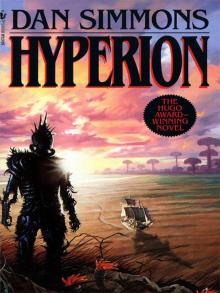 Hyperion
Hyperion The Crook Factory
The Crook Factory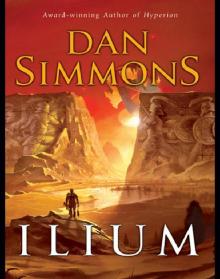 Ilium
Ilium Phases of Gravity
Phases of Gravity Hardcase
Hardcase Fires of Eden
Fires of Eden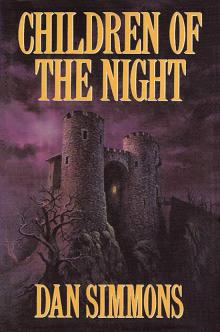 Children of the Night
Children of the Night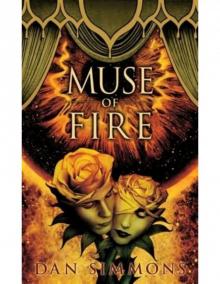 Muse of Fire
Muse of Fire Drood
Drood The Fifth Heart
The Fifth Heart Carrion Comfort
Carrion Comfort The Hollow Man
The Hollow Man Summer of Night
Summer of Night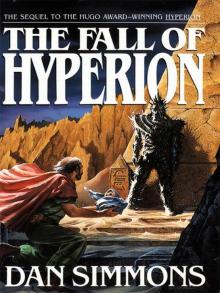 The Fall of Hyperion
The Fall of Hyperion Black Hills
Black Hills A Winter Haunting
A Winter Haunting Hard Freeze
Hard Freeze Prayers to Broken Stones
Prayers to Broken Stones Hard as Nails
Hard as Nails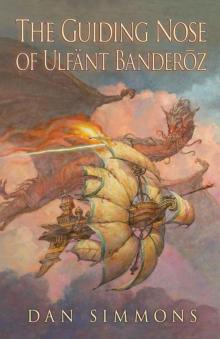 The Guiding Nose of Ulfant Banderoz
The Guiding Nose of Ulfant Banderoz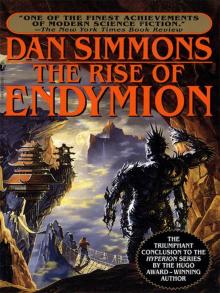 The Rise of Endymion
The Rise of Endymion Orphans of the Helix
Orphans of the Helix Lovedeath
Lovedeath Olympos
Olympos Darwin's Blade
Darwin's Blade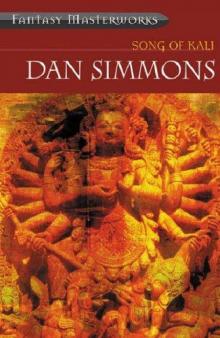 Song of Kali
Song of Kali Worlds Enough & Time: Five Tales of Speculative Fiction
Worlds Enough & Time: Five Tales of Speculative Fiction The Abominable
The Abominable The Death of the Centaur
The Death of the Centaur Hard as Nails jk-3
Hard as Nails jk-3 Worlds Enough & Time
Worlds Enough & Time Joe Kurtz Omnibus
Joe Kurtz Omnibus The Hyperion Cantos 4-Book Bundle
The Hyperion Cantos 4-Book Bundle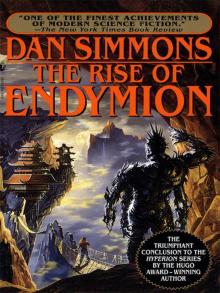 Rise of Endymion
Rise of Endymion Hard Freeze jk-2
Hard Freeze jk-2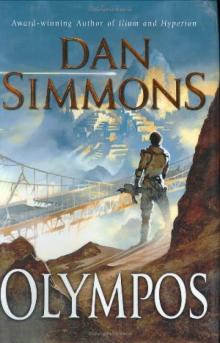 Olympos t-2
Olympos t-2 The Abominable: A Novel
The Abominable: A Novel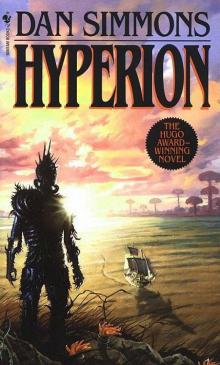 Hyperion h-1
Hyperion h-1 Remembering Siri
Remembering Siri Black Hills: A Novel
Black Hills: A Novel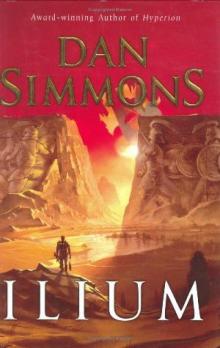 Ilium t-1
Ilium t-1 Hardcase jk-1
Hardcase jk-1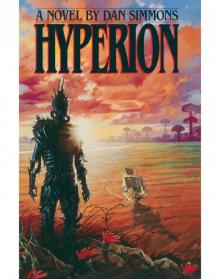 Hyperion 01 - Hyperion
Hyperion 01 - Hyperion